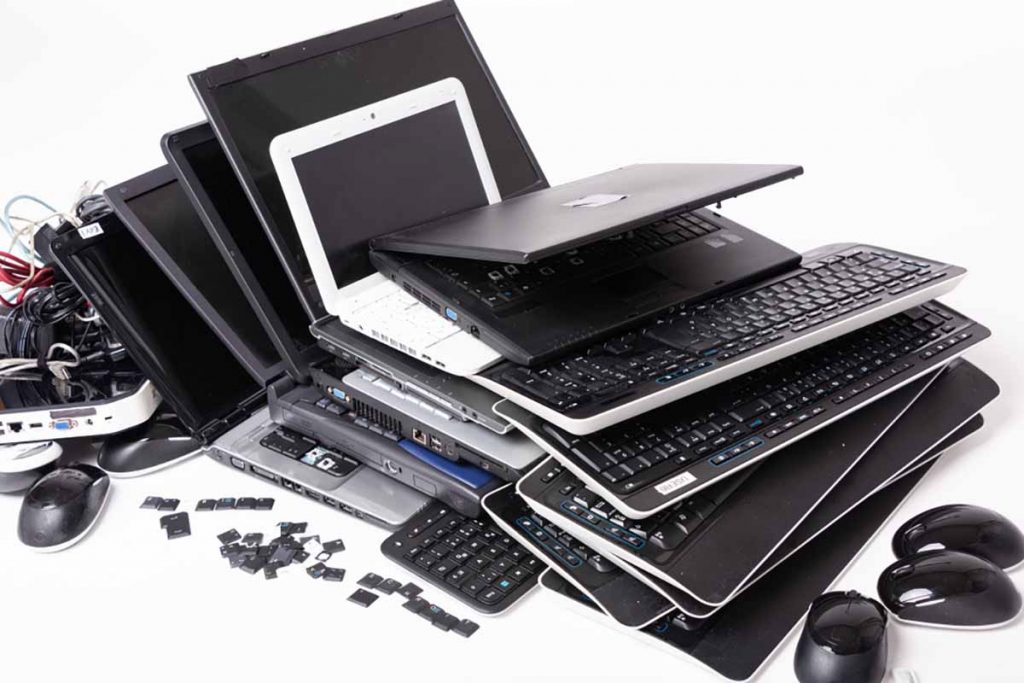
The World Economic Fund has compiled the opinions of five experts on how trade and investment can facilitate circular electronics. | Penofoto/Shutterstock
Coordinated global action is imperative to extend the life of electronics and improve end-of-life treatment, according to five industry experts in a recent World Economic Fund article.
“The electronics sector is one of the most globalized, with substantial dependencies on international trade and global value chains,” the authors wrote. “Yet, the sophisticated web of electronics value chains globally has not translated into an effective conduit for circularity and reverse supply chains, in large part due to regulatory challenges, lack of access to capital and ill-implemented trade restrictions.
“An effective international control system should advance such trade in a responsible and legitimate manner, while preventing malfeasance such as the dumping of waste in countries with inadequate waste management infrastructure.”
The five thought leaders from the WEF’s Circular Trade Community discussed multiple ways for trade and investment to play a role in circular electronics.
Making free trade agreements work for circularity
Free trade agreements and economic partnership agreements can significantly boost circular electronics by facilitating cross-border collaboration, reducing tariffs on remanufactured electronic goods and enabling the seamless movement of electronic components for recycling and repair, according to Jack Barrie, senior research fellow in circular economy at international think tank Chatham House.
These agreements can:
- Harmonize standards for e-scrap management.
- Promote investment in circular technologies and infrastructure.
- Encourage innovation in sustainable electronics design.
- Support the exchange of best practices and capacity building between nations, helping to scale up circular economy initiatives.
- Help streamline Basel Convention procedures, through electronic Prior Informed Consent, or PIC, making the international transport of e-scrap more efficient and environmentally sound.
Digital solutions to improve circularity
Transboundary movement of e-scrap presents an opportunity to increase efficiency and reduce process time through digitization, according to Mary de Wysocki, senior vice president and chief sustainability officer at digital communications giant Cisco.
“At Cisco, when we recapture valuable equipment that can be remanufactured, or harvest components and raw materials, we can decrease the need for virgin materials,” she wrote in the article.
The Basel Convention’s PIC procedure will govern all e-scrap trade as of Jan. 1, 2025. However, it was created in the 1980s and is inefficient, de Wysocki wrote.
“It is past time to modernize the PIC process and bring it into the 21st century,” she wrote, adding that digitizing the process can reduce bottlenecks to recovering e-scrap.
Achieving scale to feed circular electronics value chains
To balance profitability with environmental requirements, companies must process large volumes of e-scrap, according to Alvin Piadasa, group sustainability director at global ITAD firm SK Tes. However, not all countries produce enough feedstock to justify setting up viable recycling units.
“Reuse and end-of-life treatment is a ruthlessly scale- and capital-intensive industry,” he wrote.
Current regulations and cumbersome compliance requirements inhibit cross-border trade of electronic assets and end-of-life feedstock. The resulting lower volumes of imports limit investment in localized mechanical e-scrap facilities for global OEM clients who would value closed-loop solutions, he wrote.
“More sophisticated circular facilities with pyrolysis and hydrometallurgical lines to recover precious metals or plastics would substantially enhance a closed loop electronics value chain,” and such facilities also would encourage the development of technical skills and “green” employment in developing countries, he wrote.
Extending equipment life
Amazon Web Services is embracing three circular economy principles for its server racks by designing for reusability, wrote Ken Haig, the massive cloud computing platform’s head of energy and environmental policy, Asia-Pacific and Japan.
Keeping equipment operating efficiently and recovering value from securely decommissioned equipment through reuse, repair and recycling “allows AWS to keep resources at their highest value for as long as possible, avoiding waste generation from our global operations and reducing the use of raw materials and carbon emissions across our supply chain,” Haig wrote.
For this reason, AWS supports efforts by the Information Technology Industry Council and industry partners to build capacity for greater reuse opportunities for all, he added.
Toward a trusted trader template
Governments must control waste trade to avoid it ending up where it can’t be properly treated, wrote Kimberley Botwright, head of sustainable trade at WEF. Although the Basel Convention offers an excellent global coordination mechanism, she said, ensuring its efficient implementation requires additional efforts.
Governments with existing close economic relationships, typically within the same region, could establish trusted trader systems, Botwright wrote. In such a system, a trader moving waste across borders would be audited against agreed standards and would benefit from streamlined border processes.
“Governments could agree, at a global level, to a template for such arrangements, to avoid proliferation of diverse trusted recycler trade systems, and to ensure these do not create loopholes in the global waste trade control system,” she said.